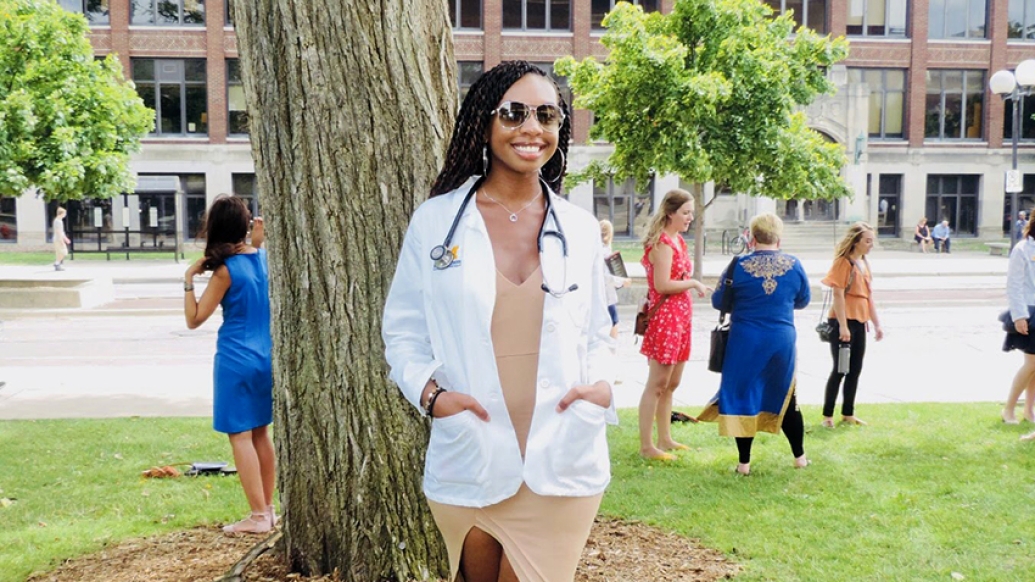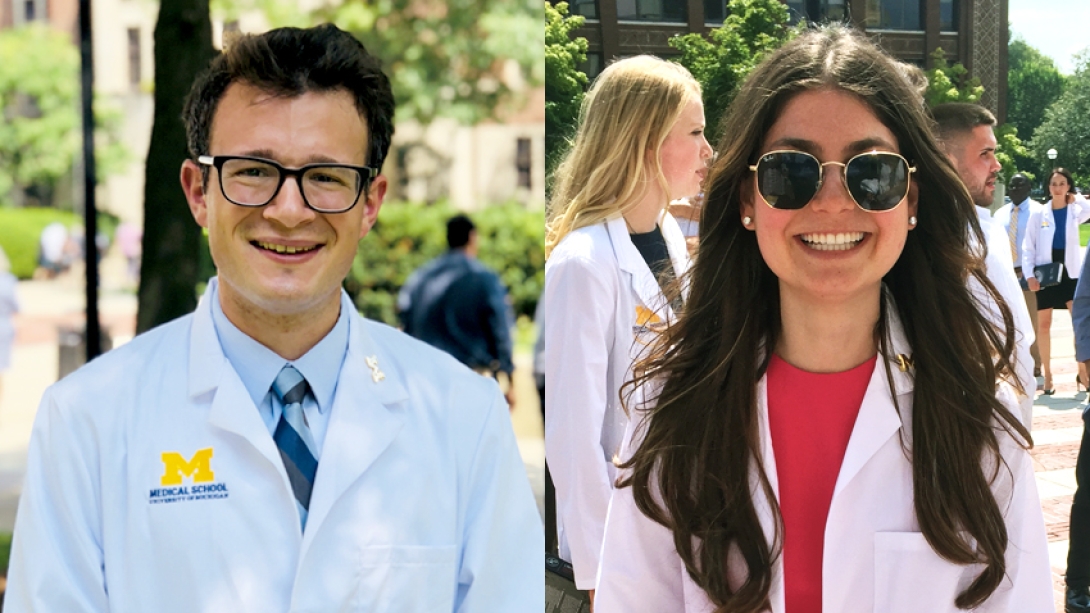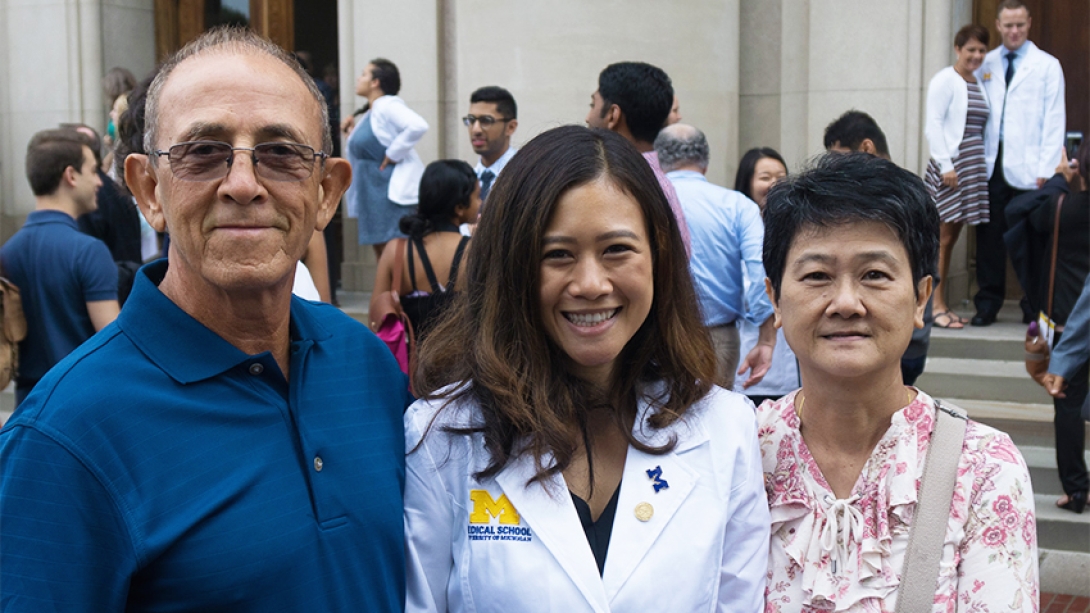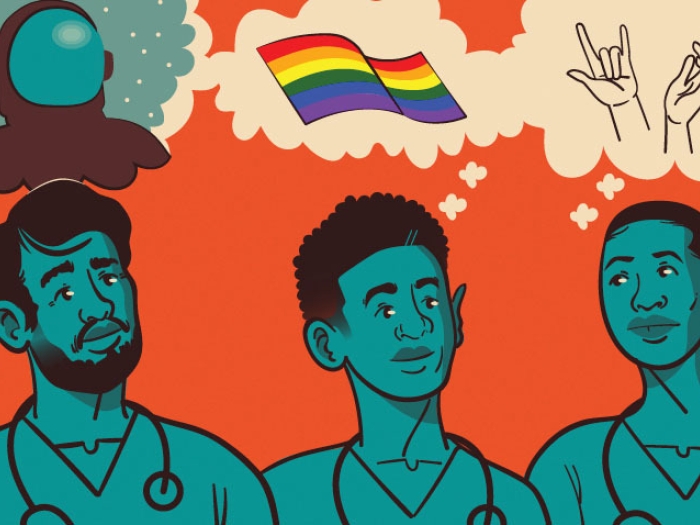Not everyone decides to be a doctor as an undergraduate. Nontraditional U-M medical students offer advice for making the transition later in life.
7:00 AM
Author |

When Adaure Nwaba was preparing to graduate from Princeton University in 2016, the notion of going straight into medical school seemed premature. She had taken the requisite coursework but wanted to explore the field of biotechnology before buckling down.
LISTEN UP: Add the new Michigan Medicine News Break to your Alexa-enabled device, or subscribe to our daily audio updates on iTunes, Google Play and Stitcher.
Extended family members, many of whom took a traditional, uninterrupted path into the health care field, had mixed feelings.
"They went to medical school years ago, at a time when taking gap years was unconventional," says Nwaba, now 24 and an M1 at the University of Michigan Medical School.
"Knowing my ultimate goal was medicine, they were uncomfortable with me taking time off, but they were supportive of my decision."
She isn't alone: Slightly more than half of U-M's first-year medical students in 2018 didn't enroll for two or more years after their undergraduate education.
That hiatus can be leveraged to gain relevant work training, fellowships and other experiences that med school admissions officers want to see — especially if an applicant's profile needs some polish.
"Doing something great and transformative during that time is what makes you a more desirable candidate," says Steven Gay, M.D., M.S., assistant dean for admissions at the U-M Medical School.
MORE FROM THE LAB: Subscribe to our weekly newsletter
Followed with an objective in mind, alternative routes have benefits.
"Nontraditional students bring a lot of different experiences and interests they want to translate into a career," Nwaba says. "Taking additional time has informed how we want to practice medicine."
She and three U-M classmates shared their personal tips for success.
Ask professors and classmates for advice
Learning about other people's paths can help inform your own. "It was really helpful being able to talk to upperclassmen who had done it successfully," says Nwaba, a Baltimore native whose conversations led her to pursue a master's degree at Johns Hopkins University.
"They felt better and more assured about medicine and the sciences and in their application as well."
SEE ALSO: Real-Life Advice from First-Generation College Students Who Made It to Med School
That's especially true for first-generation med students.
"I knew nothing about the process," says Anna Eisenberg, a Michigan M1 who changed her path as a senior at Washington University in St. Louis. "You have to think about when you're going to apply and when you're going to be able to start studying, because you haven't even learned the material yet."

Fill in academic knowledge gaps
If you didn't take the core premed classes as an undergrad, you'll need to learn the material and concepts crucial to surviving the first year of medical school.
Nontraditional students gain those skills in the form of post-baccalaureate education — one-to-two-year intensive programs designed to support the transition with a robust slate of science coursework.
Many enrollees have little to no science background. "I had never touched a lab or taken a science class," says Jacob Lowy, a Michigan M1 who studied political science at Haverford College.
These programs "squeeze all your premed recs into one year. It was pretty tough and grueling and similar to your normal M1 schedule, actually. It prepared me really well."
Pursue meaningful work experience
Getting hands-on experience in a research lab, community clinic or startup, among other places, can not only enhance your resume, but it may also help solidify a potential career.
SEE ALSO: Balancing Parenting, My Marriage and Medical School
Nwaba's time conducting health research in Nigeria and volunteering with high school students piqued an interest in pediatrics. "I have a better sense of agency, both on my own and in a school space," she says.
Other efforts can influence the notion of doctoring.
Michigan M4 Peris Castaneda spent a year teaching first-graders in a bilingual classroom in Chicago: "The best part of my job was holding after-school tutoring sessions," she says. "I loved working with kids in this really individualized way, building relationships, understanding the students and seeing them grow and make progress."
Doing something great and transformative during that time is what makes you a more desirable candidate.Steven Gay, M.D., M.S.
Take advantage of mentors
Whether it's preparing for a post-baccalaureate program, the MCAT or an on-site interview, classmates and advisers can offer key insights.
"Find the right people who are really going to understand your goals and help you out in the application process," says Castaneda, 30. "It's something that's really hard to do alone — you need a peer group, and you need mentors."
SEE ALSO: Medical Residency Interview Tips from 3 Doctors Who Do the Hiring
Lowy, now 27, worked in AIDS treatment and prevention policy for the New York State Department of Health after graduation. He was encouraged by a "great" boss to get more clinical experience, which led him to volunteer at an emergency department and pursue a post-baccalaureate program.
He later had an opportunity to work at a Latino health center housed in the pediatrics department at Johns Hopkins, where another mentor helped guide him to Michigan for medical school.

Let your passions shine
Eisenberg's interests first led her to study health care business as an undergraduate. Zeal for that subject matter fueled her pivot to a post-baccalaureate program, and to conducting HIV research with the National Institutes of Health.
SEE ALSO: Why U-M's Medical School Wants More Students With Disabilities
"The key that I honestly think got me into med school was my story and how it aligned with why I wanted to do it," she says.
Beyond career-focused objectives, give attention to hobbies and pursuits that stimulate other parts of the brain and spirit. "Do things that you are super interested in, even if they have nothing to do with medicine," says Castaneda, who also did a marketing internship and backpacked in Europe.
"When it comes time to apply to medical school, those passions will come through."
Find other students like yourself
Unlike most typical undergraduate freshmen, first-year medical students span a range of ages and work histories. Connecting with nontraditional peers can help foster community and confidence.
"A lot of my friends are 'post-bacc' people," says Eisenberg, 26. "We've been through a similar process. We come in with a different mindset … more of a bigger picture."
SEE ALSO: From a Freshman Year 'F' to a Third-Year Med Student
After working in a professional setting, "I feel really comfortable walking into a room and meeting a patient … understanding their anxieties and connecting with them about daily life," Lowy says, noting that those values apply to medical school.
"It can be overwhelming and stressful, but my previous experiences have taught me to value and embrace every opportunity to learn and challenge myself."

Explore a variety of healthcare news & stories by visiting the Health Lab home page for more articles.

Department of Communication at Michigan Medicine
Want top health & research news weekly? Sign up for Health Lab’s newsletters today!





